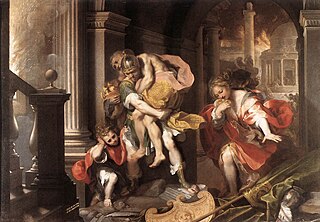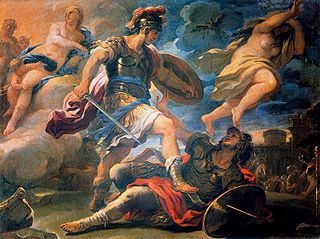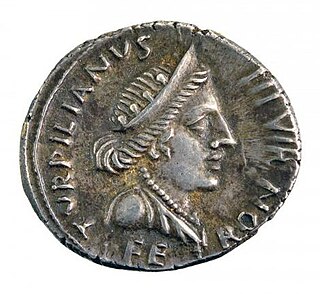
In Greco-Roman mythology, Aeneas was a Trojan hero, the son of the Dardanian prince Anchises and the Greek goddess Aphrodite. His father was a first cousin of King Priam of Troy, making Aeneas a second cousin to Priam's children. He is a minor character in Greek mythology and is mentioned in Homer's Iliad. Aeneas receives full treatment in Roman mythology, most extensively in Virgil's Aeneid, where he is cast as an ancestor of Romulus and Remus. He became the first true hero of Rome. Snorri Sturluson identifies him with the Norse god Vidarr of the Æsir.

Publius Vergilius Maro, usually called Virgil or Vergil in English, was an ancient Roman poet of the Augustan period. He composed three of the most famous poems in Latin literature: the Eclogues, the Georgics, and the epic Aeneid. A number of minor poems, collected in the Appendix Vergiliana, were attributed to him in ancient times, but modern scholars consider his authorship of these poems as dubious.

The Aeneid is a Latin epic poem, written by Virgil between 29 and 19 BC, that tells the legendary story of Aeneas, a Trojan who fled the fall of Troy and travelled to Italy, where he became the ancestor of the Romans. It comprises 9,896 lines in dactylic hexameter. The first six of the poem's twelve books tell the story of Aeneas' wanderings from Troy to Italy, and the poem's second half tells of the Trojans' ultimately victorious war upon the Latins, under whose name Aeneas and his Trojan followers are destined to be subsumed.

In Roman mythology, Evander was a culture hero from Arcadia, Greece, who was said to have brought the Greek pantheon, laws, and alphabet to Italy, where he founded the city of Pallantium on the future site of Palatine Hill, Rome, sixty years before the Trojan War. He instituted the festival of the Lupercalia. Evander was deified after his death and an altar was constructed to him on the Aventine Hill.

Turnus was the legendary King of the Rutuli in Roman history, and the chief antagonist of the hero Aeneas in Virgil's Aeneid.

In Roman mythology, Lavinia is the daughter of Latinus and Amata, and the last wife of Aeneas.
In Roman mythology, Caeculus was a son of Vulcan, and the legendary founder of Praeneste.
Aposiopesis is a figure of speech wherein a sentence is deliberately broken off and left unfinished, the ending to be supplied by the imagination, giving an impression of unwillingness or inability to continue. An example would be the threat "Get out, or else—!" This device often portrays its users as overcome with passion or modesty. To mark the occurrence of aposiopesis with punctuation, an em-rule (—) or an ellipsis (…) may be used.

In ancient Roman religion, Feronia was a goddess associated with wildlife, fertility, health, and abundance. As the goddess who granted freedom to slaves or civil rights to the most humble part of society, she was especially honored among plebeians and freedmen. Her festival, the Feroniae, was November 13 during the Ludi Plebeii, in conjunction with Fortuna Primigenia; both were goddesses of Praeneste.
Clytius, also spelled Klythios, Klytios, Clytios, and Klytius, is the name of multiple people in Greek mythology:

The Cimmerian Sibyl, by name Carmentis, was the prophetic priestess presiding over the Apollonian Oracle at Cimmerium in Italy, near Lake Avernus.
Gyas, a character in Virgil's Aeneid, features most extensively as one of the captains in the boat race in Book 5. He also appears (briefly) in Books 1 and 12. He was claimed as the eponymous ancestor of the Gegania gens, a patrician family of the Roman Republic.

The kings of Alba Longa, or Alban kings, were a series of legendary kings of Latium, who ruled from the ancient city of Alba Longa. In the mythic tradition of ancient Rome, they fill the 400-year gap between the settlement of Aeneas in Italy and the founding of the city of Rome by Romulus. It was this line of descent to which the Julii claimed kinship. The traditional line of the Alban kings ends with Numitor, the grandfather of Romulus and Remus. One later king, Gaius Cluilius, is mentioned by Roman historians, although his relation to the original line, if any, is unknown; and after his death, a few generations after the time of Romulus, the city was destroyed by Tullus Hostilius, the third King of Rome, and its population transferred to Alba's daughter city.

In Roman mythology, Pallas was the son of King Evander. In Virgil's Aeneid, Evander allows Pallas to fight against the Rutuli with Aeneas, who takes him and treats him like his own son Ascanius. In battle, Pallas proves he is a warrior, killing many Rutulians. Pallas is often compared to the Rutulian Lausus, son of Mezentius, who also dies young in battle. Tragically, however, Pallas is eventually killed by Turnus, who takes his sword-belt, which is decorated with the scene of the fifty slaughtered bridegrooms, as a spoil. Throughout the rest of Book X, Aeneas is filled with rage (furor) at the death of the youth, and he rushes through the Latin lines and mercilessly kills his way to Turnus. Turnus, however, is lured away by Juno so that he might be spared, and Aeneas kills Lausus, instead, which he instantly regrets.

Aventinus was a son of Hercules and the priestess Rhea mentioned in Virgil's Aeneid, Book vii. 656, as an ally of Mezentius and enemy of Aeneas :
Next Aventinus drives his chariot round
The Latian plains, with palms and laurels crown'd.
Proud of his steeds, he smokes along the field;
His father's hydra fills his ample shield:
A hundred serpents hiss about the brims;
The son of Hercules he justly seems
By his broad shoulders and gigantic limbs;
Of heav'nly part, and part of earthly blood,
A mortal woman mixing with a god.
For strong Alcides, after he had slain
The triple Geryon, drove from conquer'd Spain
His captive herds; and, thence in triumph led,
On Tuscan Tiber's flow'ry banks they fed.
Then on Mount Aventine the son of Jove
The priestess Rhea found, and forc'd to love.
For arms, his men long piles and jav'lins bore;
And poles with pointed steel their foes in battle gore.
Like Hercules himself his son appears,
In salvage pomp; a lion's hide he wears;
About his shoulders hangs the shaggy skin;
The teeth and gaping jaws severely grin.
Thus, like the god his father, homely dress'd,
He strides into the hall, a horrid guest.

Messapus, a character in Virgil's Aeneid, appears in Books VII to XII of the Latin epic poem. He was a son of Neptune, a famous tamer of horses, and king of Etruria, known for being one "whom no one can fell by fire or steel".
The Sortes Vergilianae is a form of divination by bibliomancy in which advice or predictions of the future are sought by interpreting passages from the works of the Roman poet Virgil. The use of Virgil for divination may date to as early as the second century AD, and is part of a wider tradition that associated the poet with magic. The system seems to have been modeled on the ancient Roman sortes as seen in the Sortes Homericae, and later the Sortes Sanctorum.
In Greek and Roman mythology, Salius is an Acarnanian who in one alternative tradition was the legendary founder of the ancient Roman priesthood of the Salii.
When writing the Aeneid, Virgil drew from his studies on the Homeric epics of the Iliad to help him create a national epic poem for the Roman people. Virgil used several characteristics associated with epic poetry, more specifically Homer's epics, including the use of hexameter verse, book division, lists of genealogies and underlying themes to draw parallels between the Romans and their cultural predecessors, the Greeks.

Eneida is a Ukrainian burlesque poem, written by Ivan Kotliarevsky in 1798. This mock-heroic poem is considered to be the first literary work published wholly in the modern Ukrainian language. Although Ukrainian was an everyday language to millions of people in Ukraine, it was officially discouraged from literary use in the area controlled by Imperial Russia.













